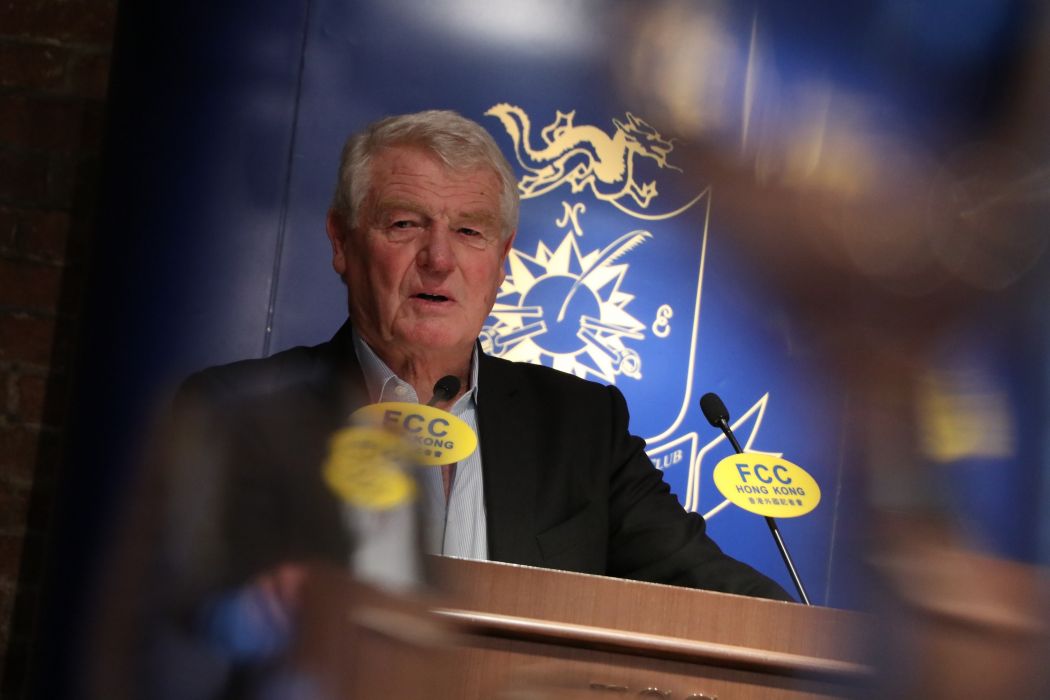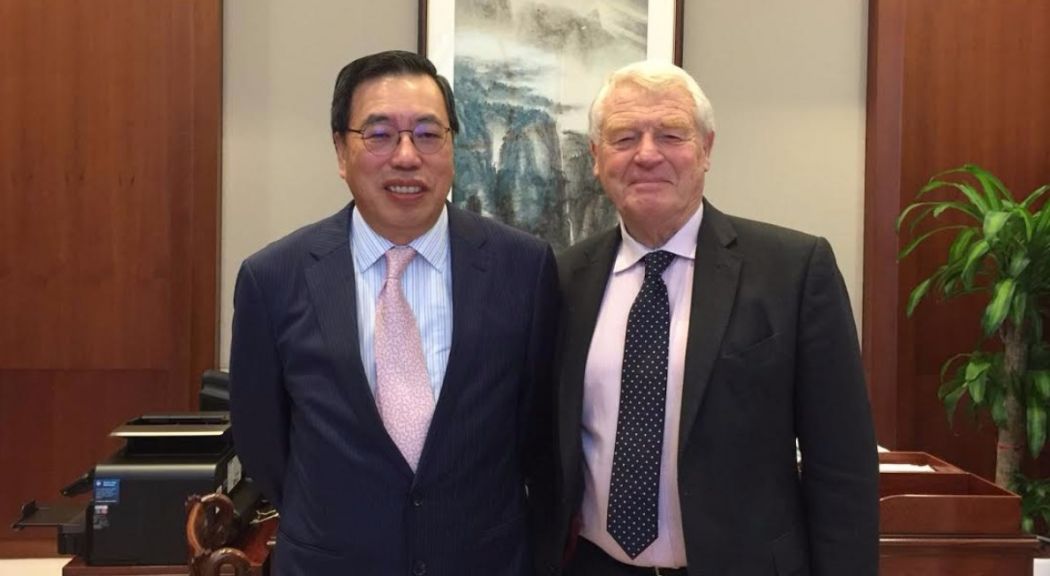The day I landed in London after having been refused entry into Hong Kong on the orders of Beijing, in October 2017, I received an email from Paddy Ashdown. “What has happened to you is incredibly serious,” he said. “It’s a flagrant violation of Hong Kong’s autonomy. Please come and see me urgently”.
A few days later we met in the House of Lords. “Since they won’t let you into Hong Kong,” he said, “why don’t I try to go instead?”
That was typical of the man who has been described as the “action man” of British politics. A few weeks later he was on a flight to Hong Kong where, during a two-day visit, he gave a speech at the Foreign Correspondents Club, and met with key pro-democracy activists in the city. Carrie Lam and other senior Hong Kong government officials refused to meet him, and the Chinese Embassy in London expressed their fury by emailing another British politician to complain.

Last Saturday, Lord Ashdown, former leader of the Liberal Democrats, one-time marine commando, intelligence agent and diplomat, one of the giants of modern British politics, a Patron of Hong Kong Watch and someone I was privileged to count as a friend, a hero and a mentor, died just two months after being diagnosed with bladder cancer. His death deprives the world of a courageous, wise and inspiring character who lived life to the full, exuded leadership and represented a better politics – where conviction, values and ideals mattered more than tribalism, where debate could be conducted with passion and vigour, rather than bitterness and enmity.
Paddy was a radical and a risk-taker who was prepared to be unconventional even to the point of physical danger – as when he visited Bosnia at the height of the war, as leader of his party, dodging snipers in search of an end to the conflict. Yet he took his party to twenty seats in his first campaign as leader in 1992, and from there to 46 parliamentary seats five years later, making it at the time the third force in British politics, until its catastrophic collapse in 2015.
He won respect across the political divide. As former prime minister Tony Blair said, “he had courage, personal and political, unafraid to speak his mind yet always open to the views of others. He was one of the least tribal politicians I have ever known.” Another former prime minister, Sir John Major, said: “In government, Paddy Ashdown was my opponent. In life, he was a much-valued friend … [He was] a man of duty, passion, and devotion to the country he loved – right up to the very end”.

But Paddy’s death doesn’t just deprive Britain of one of our greatest politicians, it deprives Hong Kong of one of its most enduring and steadfast friends. His love for the territory stemmed from three years spent there learning Mandarin Chinese from 1967-1970, when he qualified as an interpreter. He had returned several times, notably in 1989 when he marched in the streets with protestors following the Tiananmen massacre, and he had fought for the right of abode of Hong British National Overseas (BNO) passport holders.
I first met Paddy when I was a teenager, when I went to interview him for a student publication. I met him again a few years ago when, after reading his autobiography and discovering a common interest in or experience of various parts of the world including Hong Kong, China, Indonesia and Malaysia (he had fought in Borneo as a special forces commando), I wrote to him to ask if we could meet. I wanted to see how we could work together on our shared commitment to democracy, the rule of law and human rights. He agreed to meet. Never a timewaster, he told me he had twenty minutes. He took me up to his office in the House of Lords, offered me a seat, looked at me expectantly and said: “Shoot”.

Over subsequent years I met with Paddy occasionally to discuss Hong Kong, and brought Nathan Law, Joshua Wong and Anson Chan to see him. Meetings were always focused, to the point and action-oriented. As I got to know him better, we worked more closely together, particularly when he agreed to become one of Hong Kong Watch’s five Patrons and spoke at the NGO’s launch in Speaker’s House on 11 December 2017. In a statement endorsing the new organisation, he said:
As China’s power in the world grows, its responsibilities increase, and China has a responsibility to live up to its promises and obligations to Hong Kong. In recent years there are worrying signs that ‘one country, two systems’ and Hong Kong’s basic freedoms are being eroded. Britain has a responsibility to Hong Kong too, to monitor and speak out for Hong Kong’s way of life. The Sino-British Joint Declaration is precisely that – a joint declaration signed by both countries and lodged at the United Nations. Hong Kong Watch is being established to monitor, research and advocate in defence of Hong Kong’s freedoms, autonomy and rule of law and to urge both China and Britain to fulfil its obligations under the Joint Declaration, and that is why I am delighted to be a Patron of Hong Kong Watch.
I had the privilege of assisting him in planning his visit to Hong Kong and his subsequent report, which we launched in January 2018 in the House of Lords. Carrie Lam dismissed Paddy’s report as “totally unfounded and unfair” and as “interfering in Hong Kong’s internal affairs”. Paddy insisted that he was “acting absolutely within the terms of the Joint Declaration”, and raised his concerns on the floor of the House of Lords, asking: “Is the Minister aware that, according to the claims made by the Hong Kong and Chinese authorities, it is an interference in the domestic affairs of China for a British parliamentarian to visit Hong Kong to assess progress on the joint declaration? Given that the joint declaration is an international treaty lodged in the UN, which places responsibility on both sides to carry it out, will the Minister take this opportunity strenuously to reject that view and ensure that both the Hong Kong and Beijing authorities are duly notified?”

Paddy co-authored a letter to Prime Minister Theresa May, together with the last Governor of Hong Kong Lord Patten, ahead of her visit to China, urging her to raise Hong Kong with China’s leaders – which she did. After Edward Leung’s imprisonment, Paddy wrote an op-ed in the Financial Times about the misuse of old colonial laws such as the Public Order Ordinance, and earlier in the year drew comparisons between Britain’s Windrush crisis and its failure to protect Hong Kongers. And when Joshua Wong, Nathan Law and Alex Chow were jailed in August 2017, Paddy was one of 25 international dignitaries to sign a letter condemning their imprisonment.
The last time I saw Paddy in person was in his home in London on 17 October, where we met to debrief about the visit of Martin Lee, Benny Tai and Nathan Law, whom he had met two weeks previously, and to brief him on the incident at the Conservative Party Conference where a Chinese state television reporter, Kong Linlin, had shouted abuse at us and slapped one of our volunteers. When he learned that the pro-Beijing newspaper Ta Kung Pao had published a big feature alleging that he was the “black hand” behind the visit of Hong Kong democrats to the UK, he laughed and was delighted to be credited with that honour, even though it was not true.

Just over two weeks later, it was announced that he had been diagnosed with bladder cancer. We continued to keep in touch and six days before his death I emailed him, because I felt prompted to do so, to enquire how he was, to assure him of my continued thoughts and prayers, to tell him I was going to read his books Game of Spies and Nein over the Christmas break (in his later life he became an accomplished military historian), to thank him for his extraordinary support for Hong Kong and Hong Kong Watch, and to tell him that even though we come from different political traditions, he is one of my political heroes. I felt an inner voice telling me not to let him leave us without my saying these things, and I am so glad I followed the prompting.
Paddy always responded to emails, text messages and phone calls with impressive speed, given how busy he was, and he became a source of wise counsel to me, while remaining a true champion for freedom and human rights for many right until the end. He is irreplaceable, though we must, as he would wish, continue the fight, which we will.
Paddy described Hong Kong Watch’s role as being a “whistleblower”, holding both China and Britain to account for their obligations under the Joint Declaration, and we will continue blowing the whistle for Hong Kong. Indeed, the best way to honour his life and legacy is to continue the fight to defend Hong Kong’s basic freedoms, rule of law and autonomy. In so doing, we salute him and are inspired by his example.
